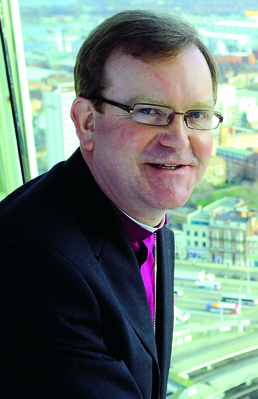Bishop calls plans to cut disability benefits "morally indefensible"
BISHOP Christopher has identified government plans to cut disability benefits as "morally indefensible".

Speaking in the House of Lords debate in response to last week’s Budget, the bishop urged ministers to govern “with a stronger moral compass”.
He criticised Chancellor George Osborne for being willing to cut benefits for the vulnerable and the disabled by £4.4bn, even though he has subsequently withdrawn the plans and admitted it was a mistake. The saga had led to the resignation of the Work and Pensions Secretary Iain Duncan Smith.
He said: “My Lords, members of the government have frequently echoed the words of the present Chancellor in his first Budget that those with the broadest shoulders would bear the greatest burden of austerity cuts.
“Given our circumstances and our ages, my Lords, I doubt if there are many members of this House who will be worse off through the government’s proposals.
“The tortuous saga of the last week finally led yesterday to a clarification – that is the politest term I can use - a clarification from the Chancellor that the government had intended that the losers would not be those with the broadest shoulders, but the vulnerable or disabled.
“That decision was morally indefensible. Having accepted the error, I trust that all of us will be willing to set our course, and the government its economic course, with a stronger moral compass.”
The bishop also congratulated the government on its intention to raise the tax-free personal allowance to £11,500, lifting 1.3m out of income tax. And he praised the extension on the time period within with the 3% stamp duty premium can be reclaimed – although he said the pay-first, reclaim-later approach wasn’t ideal.
He was pleased to see another £20m allocated to the repair of cathedrals via the First World War Centenary Cathedrals Repair Fund. He noted that both the Anglican and Roman Catholic cathedrals in Portsmouth had benefitted from this fund already.
But he was disappointed to read that England’s 59 places of worship had been described in the Budget’s Red Book as a ‘sector’.
“My Lords, these are not a sector of the economy like SMEs or banks or the leisure industry, but a vibrant and active heart of dioceses, cities and communities with growing congregations, witness and service, as statistics show,” he said.
“They do not form a sector of the economy or indeed of anything and, while I recognise that a collective noun for cathedrals is not easy to find, it demeans their present and our faith heritage to call them a sector.”
He was surprised to hear an announcement about the provision and facilities at crematoria. He said this needed to be considered with those involved such as churches, ministers and funeral directors.
And he suggested that the Church of England, who support 4,700 church schools and are already the largest provider of academies, would need to respond to the announcement that all schools would become academies.
“The Church will use its expertise and collaborative partnerships to ensure that nobody is left behind, especially small rural and coastal schools where the challenge is greatest,” he said.